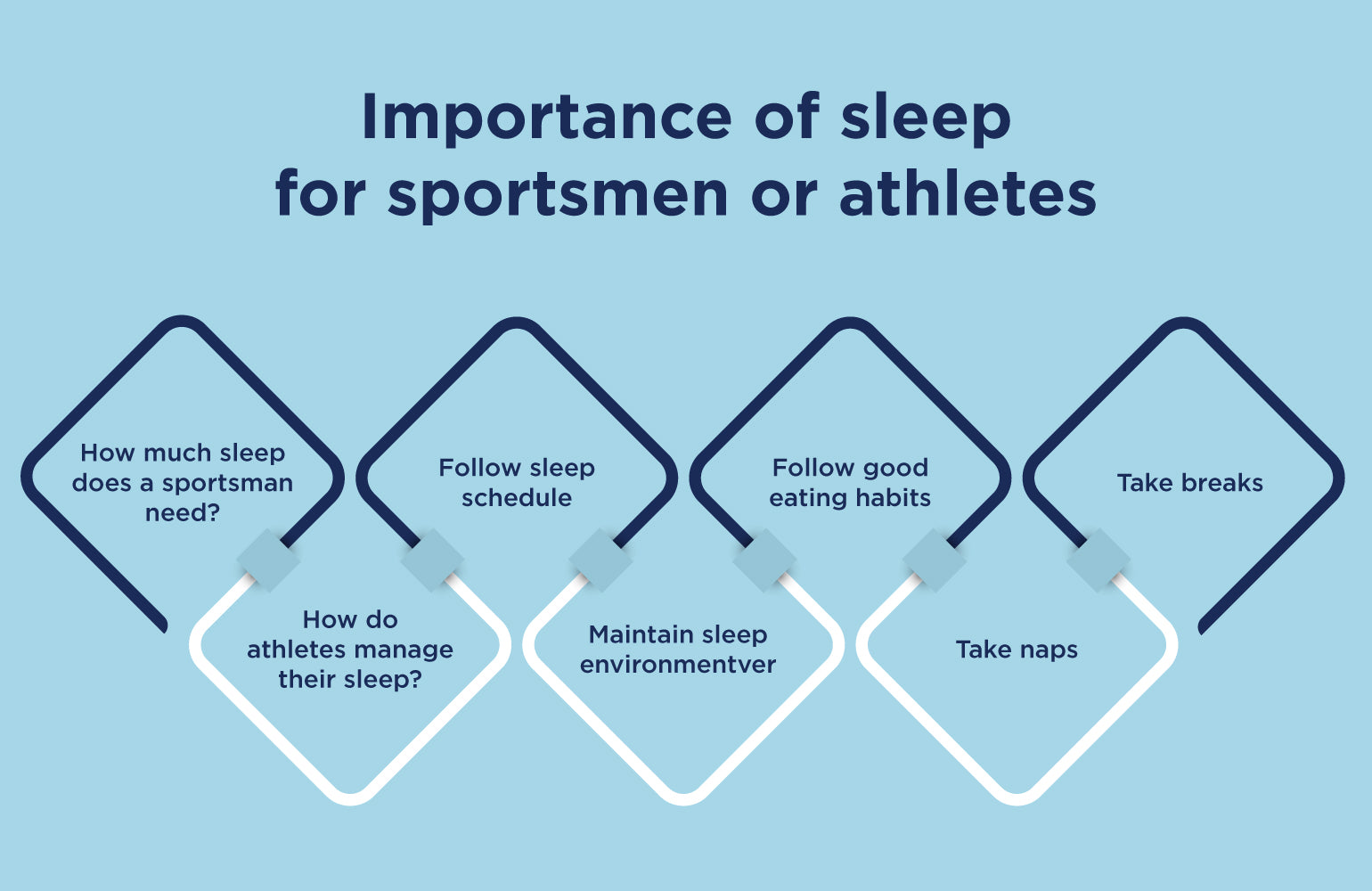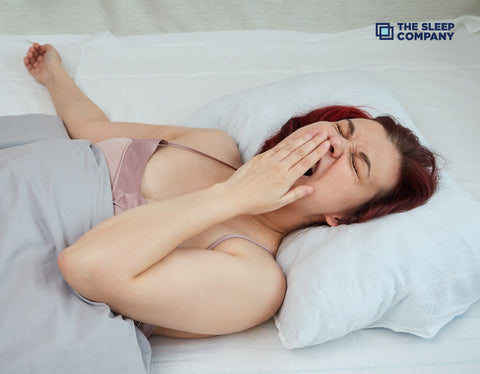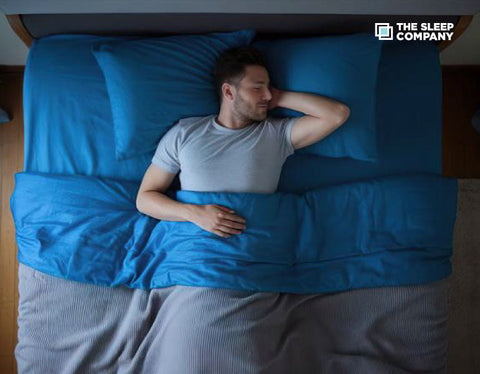My Cart

How Sportsmen Manage their Sleep Routine?

Argentina has finally bagged the trophy of the FIFA World Cup 2022, fulfilling Messi and every squad member’s goal. But do you know what they went through to win? In actuality, what do all athletes throughout the world go through, and What do they give up to be successful?
Being a sportsman comes with a lot of duties. It doesn’t help to lie on the best mattress and fantasize about being a top player. They must shoulder many other people’s expectations, including a family, coach, team members, nation, and everyone around along with their own. Have you ever wondered how they accomplish all of this and what keeps them so fit for so long? When do they manage to sleep when they spend several hours training every day and overthinking about everyone’s expectations, winning game plans, and health make them sleepless at night?
Importance of sleep for sportsmen or athletes

As we all know, a lack of sleep may lead to a variety of issues, and it is critical to get enough amount of sleep on a regular basis for a variety of reasons. Sportspeople and athletes are no exception; in fact, they require more sleep than anybody else.
- Improved performance, concentration, and accuracy
- Increased speed, fitness, and strength
- Improved response time and cognitive thinking
- Improved clarity and perspective
- Fewer mood fluctuations, psychological issue
- Fewer errors and injuries
- Increased recovery rate
- Muscle tissue repair and regeneration
How much sleep does a sportsman need?
Based on many pieces of research and findings, the average sleep hours for adults range between 7 to 9 hours per day for better results. Athletes or sports people must get at least average hours of sleep to heal and relax their tired bodies and minds faster. Sometimes pro athletes sleep 12 hours a day to speed up the muscle tissue repair and regeneration process.
How do athletes manage their sleep?
To be at the top level in their game, all athletes and sportsmen need a lot of dedication, discipline, and practice. They begin at a very young age and, for years, follow several strict sets of rules to remain healthy and strong.
Sportspeople have busy days all along, running from practice sessions, training, and matches, and for that, they have to travel a lot between two places. Sometimes games happen in different time zones and back to back and require long hours of traveling, which gives them significantly less or no time to complete their sleep, which can cause performance issues and shortened career span.
Athletes and sports people follow some sleep habits to ensure their place in sports.
Follow sleep schedule
Sportsmen always follow a strict schedule to manage all their training and other activities. And they apply it to the sleep-wake plan as well. Sometimes, players have suggested an individual sleep regime based on their health, training times, competition timings, and other things.
Maintain sleep environment
For better sleep, the surroundings matter a lot. All sportsmen pay special attention to their bedrooms and beds. Darkness, noise blocker, soothing smell, and cool temperature are maintained in the bedroom. A bed is equipped with the best bedding accessories. They only buy the best mattress with suitable firmness and comfort. They also pay attention to the material quality of comforters, pillows, and bedsheets to avoid discomfort while sleeping.
Follow good eating habits
Athletes must pay close attention to their nutrition and meal times in order to stay fit. Most of the time, they adhere to a diet prescribed by nutritionists. Players must eat a nutritious diet and avoid coffee and alcohol. Another guideline athletes follow in their daily lives is to avoid eating heavy meals at night or eating before 7 p.m. to prevent acid reflux and stomach discomfort at night, both of which are sleep disruptors.
Take naps
Most athletes get up early in the morning or travel from one location to another to compete in sports or train, resulting in insufficient sleep. In addition, they do not get the best mattress to sleep on on their route. Therefore, athletes sleep and nap whenever they can, as we’ve witnessed with our Indian cricketers MS Dhoni and his colleagues dozing on the airport lobby floor.
Take breaks
When a player is injured, it is the worst time of their life. It’s when they must improve faster than anything else to get back to action. When an athlete is hurt, they try to rest as much as possible. They also increase their sleep hours since the healing process and muscle regeneration and repair happen faster during sleep.
Six Tips to Sleep Like Pro Athletes

If you aspire to become an athlete one day or your child dreams of being the next Sachin Tendulkar or Ronaldo. Then here are some tips to improve sleep quality and remain physically strong like sportsmen.
Make a timetable
Preparing a timetable to manage your daily activities and sleep appropriately is the first step towards your dream of being a successful sportsman. Ensure to set a sleep-wake routine and manage other activities around it to make it easier.
Discipline yourself to follow a regular regime
No matter what happens, or whether it’s a holiday, discipline yourself to stick to the schedule or timetable. Though you may not practice or play on weekends, don’t fail to sleep at a regular time.
Eat proper diet
Follow a diet, take the help of nutrients experts if required but eat on time and ensure to have an adequate intake of nutrients. Avoid eating junk, oily, or heavy meals post-evening or at least 2 hours before sleeping.
Exercise
Don’t forget to exercise every day. Though you play certain sports, to train your body better, try other sports as well. Try CrossFit, yoga, and meditation for better flexibility and fitness.
Use the correct bedding accessories.
Remember a quality mattress online or offline to help you sleep comfortably without any body pain or orthopedic issues. Also, select the best comforters, pillows, cushions, or bedsheets to provide added comfort while sleeping.
Maintain a healthy sleep environment
Ensure to keep your bedroom hygienic and comfortable.
- Use dark curtains on windows and turn off lights as darkness induces melatonin production, which is a sleep hormone.
- Use fans or aircon to maintain room temperature between 16 to 18 degrees, as a cool temperature keeps you away from sweating and body heat.
- Use room fresheners or essential oils to create aromas in the bedroom as it helps in calming nerves and relaxation.
- Use sleep sounds like white or pink music, as it helps in mental relaxation and distraction from worrying thoughts.
Conclusion
Sleep is pivotal whether you are a housewife, a teenager, or a sportsperson. You’ll be astonished at how significantly a better sleeping habit improves your decision-making and performance.
FAQs
Consistency is the key for athletes. The best sleep schedule for athletes should involve a consistent bedtime sleep routine. The sleep cycle of athletes should last for 7-9 hours for full body rest. By following the same sleep routine every day, their body will be aligned with the natural body clock or circadian rhythm.
Seven hours of sleep is generally considered sufficient. However, for an athlete, sleep hours should be from 8 to 9 hours. A little longer sleep cycle of athletes ensures full body rest, including muscle recovery and cognitive performance. As athletes go through tough training sessions, they need to have a consistent sleep routine to maintain a healthy sleep schedule.
Professional athletes are required to give optimum performance. Different sleep schedules for athletes are common, and it makes it difficult for them to maintain a healthy and consistent sleep routine. Many athletes adjust their sleep routine by taking power naps in the daytime. They also try to adjust their sleep cycles as they travel a lot during their matches or training sessions.
Athletes generally follow an early sleep schedule. They often go to bed between 9 to 11 PM. This early sleep routine allows their body to get used to the natural circadian rhythm that is to wake and sleep at the same time. Consistent sleep cycles of athletes are important for their muscle repair and cognitive sharpness.
Athletes require about 4-6 sleep cycles per night. Each cycle is approximately 90 minutes. Full sleep cycles of athletes ensure that the body goes through the required phases of deep and REM sleep, which is vital for recovery and performing at one's best.


































































